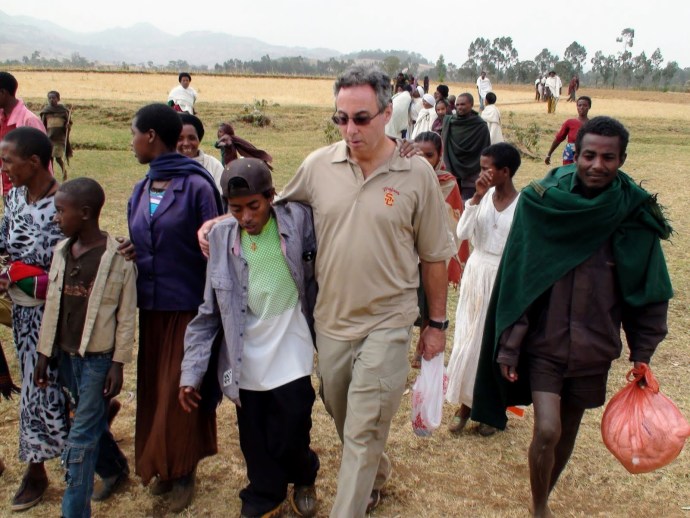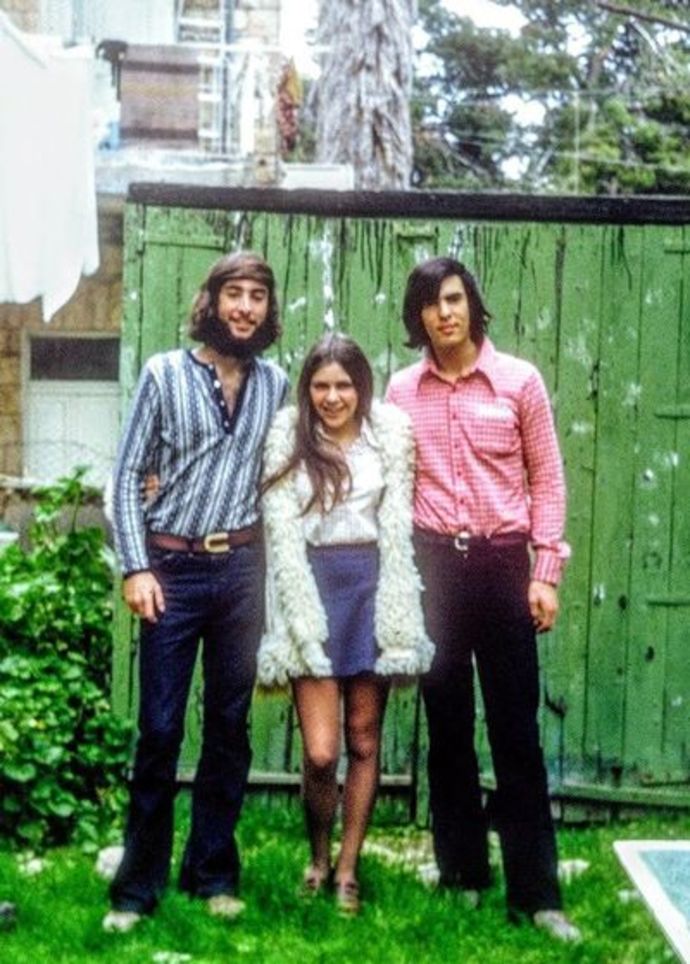'Giving has made for a much more joyful life’

A conversation with Canadian Jewish philanthropist Gary Segal
‘Studies show that when you are doing for others, you are happier,” says Gary Segal. “I am a testament to that.” On a late summer evening in Vancouver, British Columbia, the noted Canadian Jewish philanthropist and head of Kingswood Capital Corporation discusses his philosophy of charitable giving, how the year he spent studying at the Hebrew University of Jerusalem (HU) changed his life, and how travel and philanthropy have influenced it.
It is after 10:30 p.m. in Vancouver, and Segal, who received the Order of Canada for his humanitarian work, philanthropy, and service to the community, sits at his desk, wearing a suit jacket and an open-collared shirt with no tie. His workday is not quite finished. He has a full head of silver hair, and his current appearance compares favorably with a picture taken in 1971, the year he studied at HU, in which he sports a full beard and bell-bottom jeans.
“It seems like yesterday,” he says, recounting his decision to spend a year abroad studying in Israel. “My best friend and I went out for dinner and a movie in Vancouver, and afterward, while sitting in my car, we concluded that we were in a rut. It was time for a change.” Segal and his friend had both grown up in Zionist families, had attended Young Judaea summer camp, and cared about Israel. They decided to apply to Hebrew University and spend their second year of college in Israel at the Rothberg International School. Today, many college students attend university in foreign countries, either during a gap year or as part of a program, but 50 years ago it was not commonplace.
Segal arrived in Israel in mid-April 1971 and spent four months working in the chicken coops on Kibbutz Usha in Western Galilee. He fondly recalls the time he spent on the kibbutz. “It was a great experience, with all the physical labor, and it was a great chance to enhance my Hebrew, which was already pretty solid from Talmud Torah Elementary School.” As a result, Segal was able to get his Hebrew up to speed with a one-month ulpan course, unlike many of his fellow students who required two and three months of Hebrew preparatory studies. His Hebrew proficiency was so good that he attended his classes in Hebrew at the university’s Givat Ram campus (known today as the Edmond J. Safra Campus) instead of those given in English to the international students at the Mount Scopus campus.
The year Segal spent in Israel opened his eyes to more than just the Hebrew language. “It was my first foray into the global world, with its different cultures. It was fantastic.”
He recalls that in 1971, just four years after the Six Day War, the morale and the mood in Israel were very high. Because of his fluency in Hebrew, Segal met many engaging Israelis and was exposed to the multicultural side of the country.
“Hebrew University opened my eyes to the greater world and its different cultures. It excited me, and I knew that was something that I wanted to continue with in my life.”
After his year in Israel, Segal and toured East Africa on the way back to Canada, which further cemented his love of travel and his desire to learn about different cultures, which were to play a major role in his philanthropic work in Ethiopia.
Since attending Hebrew University more than 50 years ago, Segal has supported the school in a number of ways. One of his most impactful contributions has been his support of the Joseph Meyerhoff Youth Centre at Hebrew University. “I was approached to be an honoree at the Canadian Friends of Hebrew University dinner in Vancouver in 2014,” he says, “but I didn’t want to support infrastructure. I wanted to do something that would impact kids in the periphery.”
The Joseph Meyerhoff Youth Centre sends Hebrew University graduate students to Israel’s social and geographical periphery to introduce science in fun ways to the children living in these areas. Sharing their passion for science and the environment, they inspire groups of future ecologists, environmentalists, and scientists. In addition, the program brings these children to the school’s campus to plant in them the seeds of ambition that will lead them to attend university one day.
“Hebrew University was something that left an indelible mark in my heart. I knew I would continue that relationship for the rest of my life,” says Segal.
In 2007, Segal’s philanthropic activities took a more personal turn when he visited Ethiopia as part of a Jewish Federation mission to learn about the efforts of the Joint Distribution Committee (JDC) in helping members of the Jewish community there, as well as those of the community at large. Segal met Dr. Rick Hodes, who provides medical assistance to Ethiopian immigrants to Israel and had participated in 1990’s Operation Solomon – which airlifted 14,400 immigrants to Israel within a 36-hour period. Hodes is the medical director of JDC’s Ethiopia Spine and Heart project and has successfully treated numerous Ethiopian orphans with severe spinal issues.
Inspired by Hodes, Segal brought Tesfaye, a young Ethiopian villager, to Vancouver in 2009, and arranged for him to undergo life-saving spinal surgery. Accompanying Tesfaye back to his village in Ethiopia after his surgery was one of the highlights of his life, says Segal.
“That was a very different charitable experience,” he explains. “You can write checks or you can give of your time, but this was bringing something totally into your personal life.”
What can the average person do to help others who may not have the same resources and opportunity that Segal had to save a life? Segal says that people can volunteer with organizations that give them fulfillment, adding that even a small gesture can help someone in need.
“You do what you can, and sometimes what you can do is more than you think you can. Even the smallest thing can change someone’s life – just a simple acknowledgment. People want to be noticed and feel that they matter in the world. So many people don’t have that feeling. Even a hello or a smile can make them feel like they mean something and belong in the world. That’s how you can start every day – by brightening someone’s day in that way.”
Gary Segal has traveled extensively and notes that doing so has played a positive role in his philanthropy.“It has been an education like no other. Interacting with different cultures and religions is what it is all about.
Philanthropy is a love of humanity. We are one big world, and I feel energized, grateful, and fulfilled by having my philanthropy directed predominantly locally and significantly globally. There is a responsibility for both. We are one humanity, one world, and we all have similar needs and desires. If you can break through the government noise and prejudice and just relate to one another on a human level – which travel does if you do it right – and break bread with people, that is how you break down barriers and start relating and building bridges.”
As our interview comes to a close, Segal outlines his philosophy of charitable giving.
“Be authentic in what you do, look for the charity that speaks to you, and don’t overlook the people that are under the radar that for whom even a little bit of money can mean a lot. If you open your eyes, heart, and mind to helping others, life will feel more meaningful, and you will be happier. You never know the potential ripple effect that your acts of kindness and generosity, no matter how small, will have.”
This article was written in cooperation with Canadian Friends of Hebrew University.
Jerusalem Post Store
`; document.getElementById("linkPremium").innerHTML = cont; var divWithLink = document.getElementById("premium-link"); if (divWithLink !== null && divWithLink !== 'undefined') { divWithLink.style.border = "solid 1px #cb0f3e"; divWithLink.style.textAlign = "center"; divWithLink.style.marginBottom = "15px"; divWithLink.style.marginTop = "15px"; divWithLink.style.width = "100%"; divWithLink.style.backgroundColor = "#122952"; divWithLink.style.color = "#ffffff"; divWithLink.style.lineHeight = "1.5"; } } (function (v, i) { });


